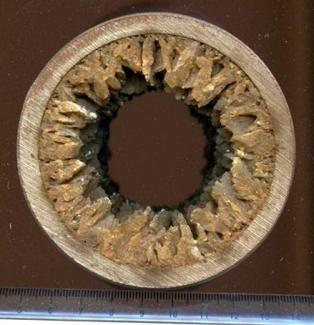NETL researchers are leading efforts to reduce mineral scaling in hydraulic fracturing operations, which can compromise wellbore integrity, obstruct the flow of gas and oil from unconventional reservoirs and impede the expansion of U.S. energy production.
“The formation of scale deposits is a significant challenge that needs to be addressed to optimize the development of the nation’s vast fossil energy resources, including the Marcellus Shale formation,” said NETL’s Barbara Kutchko, a recognized authority in the field of wellbore integrity research.
In an active unconventional well, where hydrocarbons and water are being produced at steady rates from a geochemically complex reservoir through production tubing, operations can be running smoothly until, quite suddenly, production slows and equipment malfunctions.
“The culprit? Quite often, it’s scale. In many instances, scale can reduce shale formation porosity and fracture permeability, lower production and finally block the wellbore, resulting in unplanned downtime, which raises production costs and energy prices for consumers,” said Alexandra Hakala, senior fellow for NETL’s Geological and Environmental Systems directorate.
Hydraulic fracturing involves the high-pressure injection of hydraulic fracturing fluid (HFF) to fracture the petroleum source rock in the subsurface and release hydrocarbons. HFFs are a highly variable mixture of fresh water, recycled produced water and chemical additives. Scale is the accumulation of mineral deposits that form when incompatible water sources and dissolved minerals come into contact. Scale develops on the surfaces of pipes and other equipment in impacted oil and natural gas operations.
Efforts to expand the understanding of scale formation are especially important to develop domestic fossil energy resources such as the prolific Marcellus Shale, a geologic formation buried deep under parts of Pennsylvania, New York, West Virginia, Ohio and other sections of Appalachia.
“The accumulation of mineral deposits can cause major disruptions to operations. Scale buildup, such as barite observed in Marcellus wells, can seal off pores and fractures in reservoirs and accumulate in production components, leading to blockage and poor productivity,” Kutchko said.
NETL researchers have investigated the impact of injection fluids on mineral scale precipitation within the steel production casings of unconventional shale wells.
In one NETL-led study, low-carbon steel coupons (pieces of metal with the same composition as the casings) were exposed to synthetic HFF in an autoclave set at 50o C and 2000 pounds per square inch of pressure for two, seven, 14 and 28 days. Physical and mineralogical changes to the surface of the steel coupons were observed using a scanning electron microscope, and reacted effluent was measured for concentration of barium, iron, calcium and other elements.
Their investigation demonstrated that mineral scale precipitation can occur in solutions before interaction with reservoir mineralogy, and barite scale can develop within the wellbore despite the addition of scale inhibitors to the injection fluid.
Barite scale precipitation can occur within the first two days of hydraulic fracturing. In addition, barite colloids are small enough (1-12 microns) to pass through standard filtration methods.
As part of another NETL study, researchers noted that immediately after fracturing, HFF sits in a wellbore for a variable amount of time until production begins. During this “soak” time, an aerated-caustic fluid, supersaturated with minerals, remains in contact with the steel components. The reaction of the HFFs with the steel wellbore was shown to influence corrosion precipitates and scale mineralization within 48 hours.
These insights into how HFFs affect mineral scaling can improve pre-injection water treatment practices to prevent blockages of tubing, tubing joints and other components, reduce remediation expenditures and prevent lost production time.
NETL is a DOE national laboratory dedicated to advancing the nation’s energy future by creating innovative solutions that strengthen the security, affordability and reliability of energy systems and natural resources. With laboratories in Albany, Oregon; Morgantown, West Virginia; and Pittsburgh, Pennsylvania, NETL creates advanced energy technologies that support DOE’s mission while fostering collaborations that will lead to a resilient and abundant energy future for the nation.




